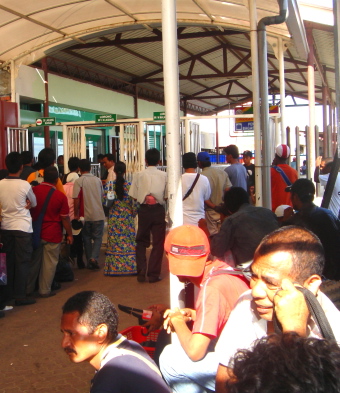Indonesian migrant workers without visas - or sometimes even passports - rely on the help of middlemen to get past immigration checkpoints into East Malaysia
Nurul Ilmi Idrus
|
|
Every day migrant workers from South Sulawesi enter Sabah state in East Malaysia illegally, without visas and passports, mainly in search of work on palm oil plantations. Take, for example, Syarifah and her husband, Ramli, who were jobless and landless in South Sulawesi. They heard from other villagers that there was plenty of work in Malaysia that paid well. Syarifah and Ramli could have registered to go under the state migration program which would have given them the necessary papers. They decided to use a calo (middleman) instead because they wanted to bypass the complicated bureaucracy associated with migrating legally. Heavy punishments such as fines, imprisonment and canings are supposed to deter people from looking for work in Malaysia without the right documents, but people like Syarifah and Ramli decide to take the risk anyway.
Crossing the border
Indonesians without work visas or passports can cross the border into East Malaysia in several different ways. Many go via the Nunukan-Tawau border crossing. Some pass through the hundreds of illegal crossing points (jalan tikus) along the East Kalimantan border. They rarely make this crossing unassisted. Intending migrant workers enlist the help of calo to take care of everything. These middlemen sort out the logistics of getting their clients to Nunukan and find them a place to stay once they get there. Sometimes they even drive the boats.
Ultimately the cost depends on the distance. An illegal crossing to Kalabakan, which is 55 kilometres from the border, is much cheaper than to, say, Keningau which is much further inland. The further the journey, the higher the risk. Sometimes the journey is made without meeting anyone, but it is always possible that they will be caught by a border patrol. The cost of the trip thus includes a fee for bribes.
Not everyone makes an illegal crossing furtively. Some front up to border checkpoints along with travellers and documented migrant workers with no more than a tourist pass or even no documents at all. Boats arrive from Nunukan with hundreds of travellers at a time, making the harbour at Tawau overcrowded and difficult to monitor. It is almost impossible to tell legal and illegal migrants apart in these conditions, especially as calo teach their charges how to blend in with the other passengers and give them a sign when it's safe to make the crossing by boat. A popular term used among migrant workers for this is 'pandai-pandailah', meaning that you need to be cunning in order to avoid attracting the suspicion of police or immigration officials. On other occasions, calo try to bribe immigration officials to make sure that things go smoothly.
Heroes and villains
Calo are considered heroes by many prospective workers, as well as by other Indonesians who want to travel without a passport. For example, Yusuf first made the trip across the border illegally to look for work in Sabah's plantation sector. When his visitor's pass was about to run out, his employer offered to help him get the documents he needed to stay legally. So Yusuf made another illegal crossing but this time back to Indonesia. With the help of a calo he was able to make the crossing from Tawau at a reasonable price making it back to Nunukan to get a passport and visa. He could never have done this on his own.
But calo can also be cheats. Syarifah and Ramli were charged so much for their journey that they had to work on a Malaysian plantation for about two years to pay off their debt. They had to take out loans for food and accommodation which drove their debts even higher. While on the plantation, Syarifah and Ramli were watched by guards day and night to make sure that they didn't abscond. Their bosses even threatened to report them to the police for working illegally if they caused trouble. After a number of failed attempts, they finally managed to escape in the middle of the night.
Syarifah and Ramli were charged so much for their journey that they had to work on a Malaysian plantation for about two years to pay off their debt
Syarifah and Ramli's experience shows that calo do not always have the best interests of their charges at heart. This is really not so surprising. After all, although calo play a significant role in helping Indonesians to work in Malaysia, they do it first and foremost for their own financial gain. In many cases, calo work directly for the plantation owners, who tell them how many workers are needed. The calo then fill the job orders in exchange for a fee for each recruit as well as a cut of their daily wages.
Migrants who work illegally in East Malaysia, like Syarifah and Ramli, do so at the risk of getting caught in one of Malaysia's frequent crackdowns. Their reasons for doing so are complex, though of course they include the lack of employment opportunities at home. After all, they might never have gone to Malaysia in the first place if there'd been good jobs available in their village. But what is clear is that migrants like Syarifah and Rami almost certainly would never have been able to get there without the help of calo and the willingness of government officials to look the other way.
Nurul Ilmi Idrus (nurulilmiidrus@yahoo.com) teaches in the Department of Anthropology at Hasanuddin University in Makassar.












